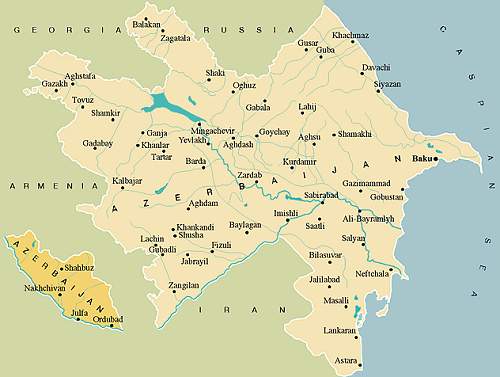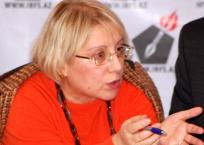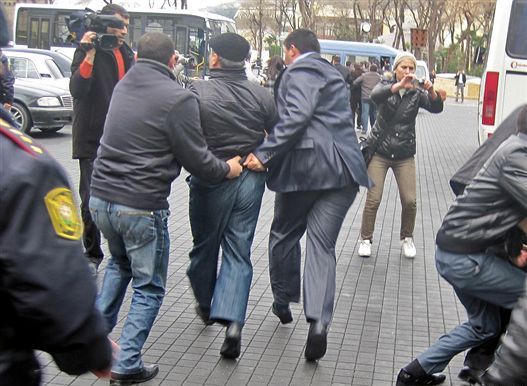The Authonomous Republic of Nakhchivan (NAR)
 The Norwegian Helsinki Committee would like to highlight the autonomous republic of Nakhchivan as a region which has particularly serious problems in the field of human rights. Late last year NHC published a report in which we pointed out abuses of NGO activists, journalists and ordinary citizens.
The Norwegian Helsinki Committee would like to highlight the autonomous republic of Nakhchivan as a region which has particularly serious problems in the field of human rights. Late last year NHC published a report in which we pointed out abuses of NGO activists, journalists and ordinary citizens.
On August 24, Turac Zeynalov, a resident of Nakhchivan, was summoned to the Ministry of National Security and never returned. The day after he was shown to his close relatives with a bag on his head. He had been so badly beaten that he was not able to move. Zeynalov, born in 1980, died. NHC welcomes the fact that Azerbaijan’s Human Rights Ombudsman Elmira Suleymanova has asked the prosecutor-general and national security minister to investigate Zeynalov’s death. The responsible for Zeynalov’s death brought to justice.
Illegal expropriations, forcible evictions, and home demolitions
 Rule of Law is also disrespected in the illegal expropriations, forcible evictions, and home demolitions in the capital, Baku. This became particularly apparent when the office building of human rights defender Leyla Yunus was illegally razed to the ground in central Baku on August 11, 2011. It is a striking fact in this case that Ms Yunus has been defending the rights of citizens who have suffered such violations of the rights to property. The Government of Azerbaijan must make sure that the victims of illegal deprivation of property will be compensated and that further illegal deprivation is stopped.
Rule of Law is also disrespected in the illegal expropriations, forcible evictions, and home demolitions in the capital, Baku. This became particularly apparent when the office building of human rights defender Leyla Yunus was illegally razed to the ground in central Baku on August 11, 2011. It is a striking fact in this case that Ms Yunus has been defending the rights of citizens who have suffered such violations of the rights to property. The Government of Azerbaijan must make sure that the victims of illegal deprivation of property will be compensated and that further illegal deprivation is stopped.
Democracy and elections
 Azerbaijan held elections to the national assembly in November 2010. The elections were again a farce and the OSCE published a report with a number of recommendations. After almost 10 years’ work with new electoral laws there is still not a system for membership of electoral commissions which can build trust among the population. At this election the period permitted for election campaigning was also shortened so much that it was not possible to hold a genuine election campaign. Although this theme is now well-worn, it is important not to stop working on applying the necessary pressure on the authorities in order to dramatically improve the framework for elections. The authorities should find solutions to the many challenges through genuine consultation with the parties and civil society.
Azerbaijan held elections to the national assembly in November 2010. The elections were again a farce and the OSCE published a report with a number of recommendations. After almost 10 years’ work with new electoral laws there is still not a system for membership of electoral commissions which can build trust among the population. At this election the period permitted for election campaigning was also shortened so much that it was not possible to hold a genuine election campaign. Although this theme is now well-worn, it is important not to stop working on applying the necessary pressure on the authorities in order to dramatically improve the framework for elections. The authorities should find solutions to the many challenges through genuine consultation with the parties and civil society.
Freedom of Assembly
 Local human rights activists frequently experience harassment and threats. Nakhchivan-based Malahat Nasibova and her husband Ilgar Nasib as well as Vugar Gojayev , have all experienced violence and threat of violence, that their close relatives have lost their jobs and that their children are thrown out of school. On 14-15 October in Venice, the Venice Commission concluded an assessment regarding the compliance of Azerbaijan’s new law on NGOs, and expressed concern at about the negative impact of new forms for registration of branches and representative offices of international NGOs wishing to operate in Azerbaijan.
Local human rights activists frequently experience harassment and threats. Nakhchivan-based Malahat Nasibova and her husband Ilgar Nasib as well as Vugar Gojayev , have all experienced violence and threat of violence, that their close relatives have lost their jobs and that their children are thrown out of school. On 14-15 October in Venice, the Venice Commission concluded an assessment regarding the compliance of Azerbaijan’s new law on NGOs, and expressed concern at about the negative impact of new forms for registration of branches and representative offices of international NGOs wishing to operate in Azerbaijan.
The Human Rights House in Baku, which is commonly known as “The Norwegian” Human Rights House because of the Norwegian initiative behind Human Rights House Foundation, has been forcibly closed by the authorities. Also the activities of National Democratic Institute were suspended. Opposition parties are also concerned about restrictive measures of the recently amended Law on Political Parties, and the Venice Commission has currently this law and amendments under consideration.
Media freedom
 The authorities obstruct a free media in almost every possible way. Imprisonment and violence against journalists are everyday events, and legislation and bureaucracy are also misused to obstruct media which oppose the authorities. The small alternative press which remains must be protected. One particularly potent weapon used against journalists and editors is legislation which makes defamation a criminal offence. According to Azerbaijani authorities, amendments to the legislation to abolish criminal defamation is underway, and may be presented to the Parliament (Milli Majlis) before years’ end. We sincerely hope this is the case.
The authorities obstruct a free media in almost every possible way. Imprisonment and violence against journalists are everyday events, and legislation and bureaucracy are also misused to obstruct media which oppose the authorities. The small alternative press which remains must be protected. One particularly potent weapon used against journalists and editors is legislation which makes defamation a criminal offence. According to Azerbaijani authorities, amendments to the legislation to abolish criminal defamation is underway, and may be presented to the Parliament (Milli Majlis) before years’ end. We sincerely hope this is the case.
Convictions of persons on political grounds.
In Azerbaijan, we have seen for years that courts are being misused in the attempt of silencing journalists opposing the current regime. Now, opposition politicians, youth activists and human rights defenders are being targeted for convictions as well. Trumped up charges and limited access to defense and legal counsel, as well as convictions even though evidence is absent are common traits of these cases.
 In March and April street protests were organised in Baku, protests considered illegal by the authorities. Protesters were brutally dispersed and dozens arrested and swiftly convicted to up to 15 days in prison, mostly in closed trials.Several of the protesters and other activists have been convicted to long prison terms and currently trials against opposition leaders are ongoing. We also remind you, that the Council of Europe Parliamentary Assembly rapporteur on political prisoners in Azerbaijan Christoph Strasser has yet to be permitted by the Azerbaijani authorities to visit the country. The situation with political prisoners in Azerbaijan will be discussed on November 16 at the session of the Legal Affairs and Human Rights Committee of the Parliamentary Assembly of Council of Europe (PACE) in Paris.
In March and April street protests were organised in Baku, protests considered illegal by the authorities. Protesters were brutally dispersed and dozens arrested and swiftly convicted to up to 15 days in prison, mostly in closed trials.Several of the protesters and other activists have been convicted to long prison terms and currently trials against opposition leaders are ongoing. We also remind you, that the Council of Europe Parliamentary Assembly rapporteur on political prisoners in Azerbaijan Christoph Strasser has yet to be permitted by the Azerbaijani authorities to visit the country. The situation with political prisoners in Azerbaijan will be discussed on November 16 at the session of the Legal Affairs and Human Rights Committee of the Parliamentary Assembly of Council of Europe (PACE) in Paris.
***
The list of political prisoners in Azerbaijan can be found here
Related stories
HRHF draws attention to HR concerns in Azerbaijan, Georgia, Kenya
52 organizations jointly condemn demolishion of Leyla Yunus house in Baku





